新概念2第九课
- 格式:ppt
- 大小:5.51 MB
- 文档页数:50

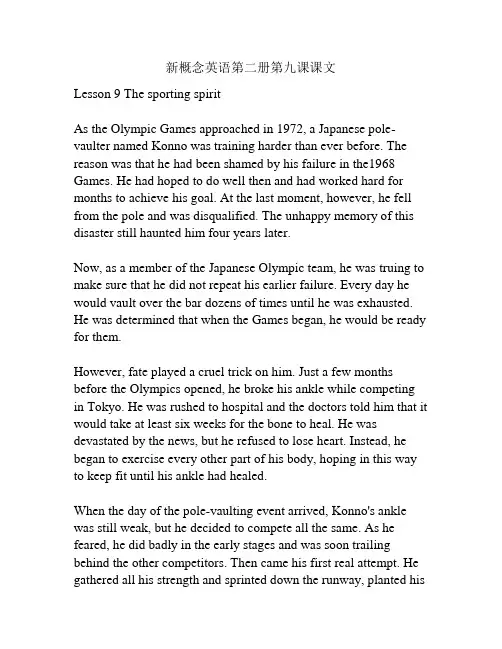
新概念英语第二册第九课课文Lesson 9 The sporting spiritAs the Olympic Games approached in 1972, a Japanese pole-vaulter named Konno was training harder than ever before. The reason was that he had been shamed by his failure in the1968 Games. He had hoped to do well then and had worked hard for months to achieve his goal. At the last moment, however, he fell from the pole and was disqualified. The unhappy memory of this disaster still haunted him four years later.Now, as a member of the Japanese Olympic team, he was truing to make sure that he did not repeat his earlier failure. Every day he would vault over the bar dozens of times until he was exhausted. He was determined that when the Games began, he would be ready for them.However, fate played a cruel trick on him. Just a few months before the Olympics opened, he broke his ankle while competing in Tokyo. He was rushed to hospital and the doctors told him that it would take at least six weeks for the bone to heal. He was devastated by the news, but he refused to lose heart. Instead, he began to exercise every other part of his body, hoping in this way to keep fit until his ankle had healed.When the day of the pole-vaulting event arrived, Konno's ankle was still weak, but he decided to compete all the same. As he feared, he did badly in the early stages and was soon trailing behind the other competitors. Then came his first real attempt. He gathered all his strength and sprinted down the runway, planted hispole firmly in the ground and hurled himself into the air. For a heart-stopping moment, he seemed to be failing again, but somehow he managed to twist his body so that he fell across the bar without knocking it off. The crowd cheered wildly as the judges signalled that the jump was successful.Konno was encouraged by his success and went on to make two other jumps, each one slightly better than the last. When the competition ended, he found to his amazement that he had won a bronze medal. It was not the gold medal he had hoped for, but it was still an achievement of which he could be proud.The story of Konno teaches us an important lesson about sport. It is not enough merely to possess great physical ability. To be a true sportsman one must also have courage, determination and, above all, the sporting spirit. The true sportsman does not lose heart when he is defeated. He picks himself up and tries again, even if he is handicapped by injury or illness. He strives to do his best under all circumstances, never forgetting that it is not winning but taking part that counts. This is the sporting spirit, and it is the noblest of all human qualities.。
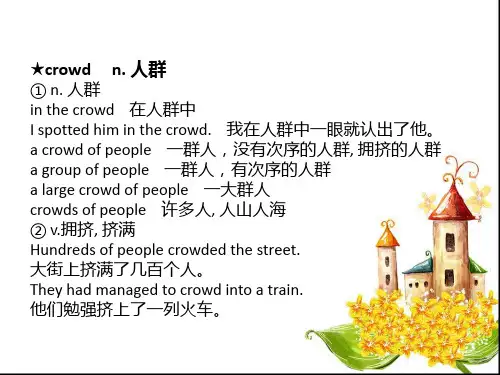

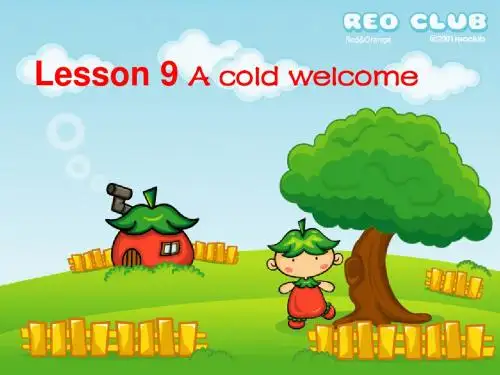

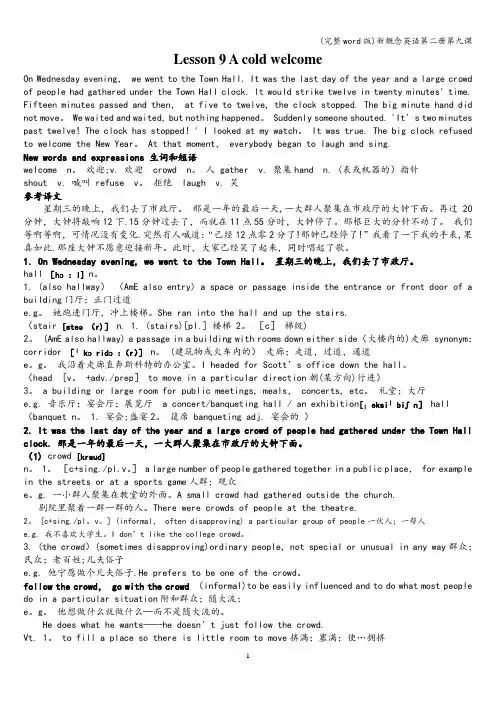
Lesson 9 A cold welcomeOn Wednesday evening, we went to the Town Hall. It was the last day of the year and a large crowd of people had gathered under the Town Hall clock. It would strike twelve in twenty minutes' time. Fifteen minutes passed and then, at five to twelve, the clock stopped. The big minute hand did not move。
We waited and waited, but nothing happened。
Suddenly someone shouted. 'It’s two minutes past twelve! The clock has stopped!' I looked at my watch。
It was true. The big clock refused to welcome the New Year。
At that moment, everybody began to laugh and sing.New words and expressions 生词和短语welcome n。
欢迎;v. 欢迎 crowd n。
人 gather v. 聚集hand n. (表或机器的)指针shout v. 喊叫 refuse v。
拒绝 laugh v. 笑参考译文星期三的晚上,我们去了市政厅。
那是一年的最后一天,一大群人聚集在市政厅的大钟下面。
再过20分钟,大钟将敲响12下.15分钟过去了,而就在11点55分时,大钟停了。
那根巨大的分针不动了。
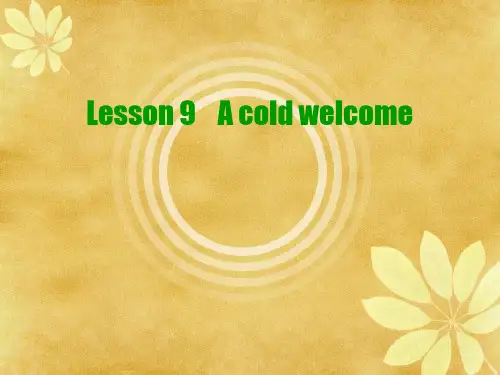



2024年新概念英语第二册第九课教案设计实用一、教学目标1.让学生掌握本课的生词及短语。
2.培养学生正确朗读课文,理解课文大意。
3.引导学生运用所学句型进行实际交流。
二、教学重点1.生词:engineer,laboratory,assistant,instrument,operate,equipment, expln,plicated,specialize,particular,field,research,experim ent,perform,demonstration,presentation,procedure,operate,me asurement,precise,accurate,etc.2.句型:Couldyouhelpmewith?/I'mspecializingin/Inourlaboratory,we三、教学难点1.生词的正确拼写和发音。
2.句型的运用。
四、教学过程第一环节:导入1.利用图片或实物,让学生猜测本课主题。
2.学生分享他们对实验室和实验的了解。
第二环节:生词教学1.教师展示生词卡片,让学生跟读并模仿发音。
2.学生分组,进行生词接龙游戏,巩固生词记忆。
第三环节:课文教学1.教师播放课文录音,让学生跟读。
2.教师引导学生逐句分析课文,解释生词和短语。
3.学生分组,分角色朗读课文。
第四环节:语法教学1.教师讲解本课重点句型,让学生进行模仿练习。
2.学生分组,运用句型进行实际交流。
第五环节:练习与巩固1.学生完成课后练习题,教师逐个解答。
2.教师设计一些实际场景,让学生运用所学知识进行交流。
第六环节:课堂小结2.学生分享他们的学习心得和收获。
五、课后作业1.复习本课生词和短语,熟读课文。
2.运用本课句型,编写一篇关于实验室的短文。
六、教学反思本节课结束后,教师应认真反思教学效果,针对学生的掌握情况,调整教学方法和进度,以提高教学质量。
1.导入(1)教师利用图片或实物,让学生猜测本课主题。
Lesson 9 A cold welcome 冷遇 ⼀、⽣词讲解 1、welcome n. 欢迎;v. 欢迎 a cold welcome 冷遇 welcome to+地点 例如:welcome to China You are welcome./welcome adj.或You are welcome to+地点 例如:welcome to my home/welcome home/ welcome back 2、crowd n. ⼈群 crowd :in the crowd I spotted him in the crowd ⼀眼看见 a crowd of people 没有次序的⼈群,拥挤的⼈群 a group of people 有次序的⼈群 crowd v.拥挤,挤满 a large crowd of people ⼀⼤群⼈/crowds of people 许多⼈,⼈⼭⼈海 3、gather v. 聚集 people gathered ⼈们聚集在⼀起,尤指⾃发性的聚集 4、hand n. (表或机器的)指针 hand n.⼿ minute hand/second hand/hour hand second hand ⼆⼿的,旧的 wait me a moment/wait me a few seconds(for a few seconds.) 5、shout v. 喊叫 call out ⼤声喊叫 cry out ⼤声哭喊 scream 尖叫 ⼆、本⽂重点语法讲解 本篇课⽂的重点是时间介词的⽤法。
这部分知识点实⽤性很强,在PET, BETS2 中是必考项⽬,同时在⼩升初考试中也是完形填空常考知识点。
只要多⽐较,多练,通过造句⼦区分各个知识点,学⽣⼤部分都能将这部分知识点掌握好,尤其时想在考试中拿⾼分的学⽣,千万不要忽视这样的细节知识点哦! 让我们来看看具体的时间介词家族成员吧: At:表⽰在某时刻,时间,阶段,如at noon 在中午,at night在夜晚,还有具体时刻at 12 o'clock等;时刻前的介词⽤at:at five to twelve作时间状语 In :强调在⼀段时间内,如在早,午,晚in the morning, in the afteronno, in the evening. 课⽂中in twenty minutes' time 20分钟之后,in 表⽰在段时间以后,根据时态判别in 表⽰的含义。
新概念英语第二册第九课课后习题答案Lesson 91。
b 根据课文内容It was the last day of the year…和The big clockrefused to welcome the New Year, b 最符合课文内容,其他3个选择都不对。
2. b根据课文。
..at five to twelve,the clockstopped.钟是在午夜前停的,但人们是在午夜后才意识到这一点的.(It’s two minutes pasttwelve!),所以b。
是对的。
a. before midnight 和课文事实不符合。
钟是在午夜前停的,但人们是在午夜后才意识到这一点的。
3。
d the evening 前需要有介词in才能构成表示时间的短语,所以选d。
其他3个选择都不对.4。
a people 是集体名词,虽然形式是单数,但意思是复数的(人民或人们),做主语时候谓语动词要用复数形式。
B。
was, c。
is ,d be 都不能用在people 后面做谓语动词,只有a。
were 可以,所以选a.5。
a 这个问句的回答是一个表示时间的短语,因此需要一个针对时间提问的疑问词。
只有a。
when是针对时间提问的,而其他3个都不是问时间的.6。
b在表示钟点的时间短语前面用介词at,所以只有b. at 是对的。
7。
b从回答中可以看出,这个疑问句需要一个能够针对nothing提问的词,而且要能够在疑问句中充当主语.a。
nothing可以做主语,但一般不用在疑问句中;c. any 是量词,不能做主语;d. athing可以做主语,用在这个问句中意思虽然通顺,但不符合习惯用法;b. anything是不定代词,可以做主语,而且只能在疑问句中做主语,所以b.是对的.8. d a. hit , b. beat, c。
knock ,d。
strike这几个动词中都有“敲",“打”,“击"的意思,但是只有strike 有“(钟表)敲鸣”,“报时”的含义,所以最佳选择是d.9. b 本句表示钟点的短"几点过几分"中只能用介词past,所以只有b。